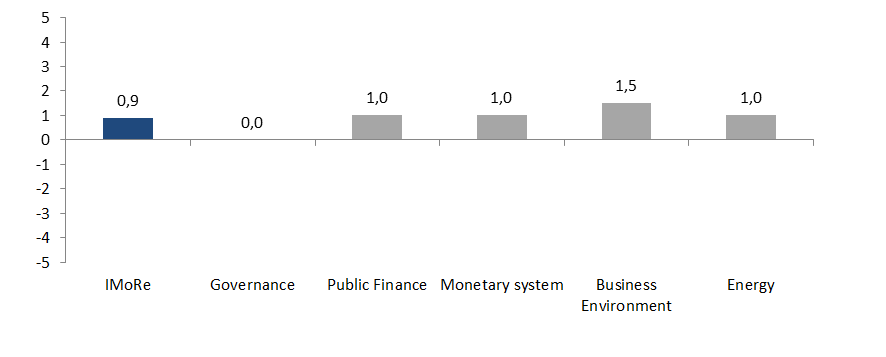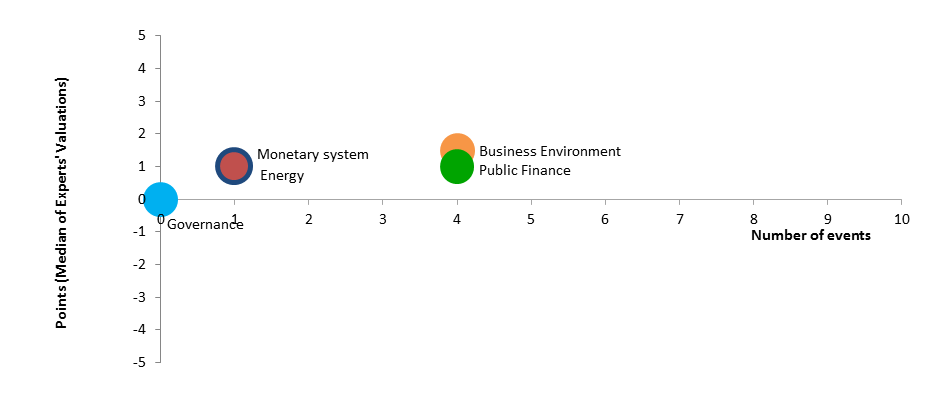In mid-October reforms accelerated slightly. Reform Index for October 10 – October 23 rose to a mark of +0.9 points out of a possible +5 points. The greatest progress was recorded in reforming business environment. Positive changes were also observed in public finance, monetary system and energy sector.
Chart 1. Reform Index dynamics*

* Reform Index team considers index value of at least 2 an acceptable pace of reform
Among the major events of this round are legislative changes that allow wineries to sell their products on the market directly, rather than through bottling companies, a clearing-up of the legal status of land plots of deceased individuals, the abolition of a single focused index of the customs value of goods, a legislative determination of the maximum natural gas reserve permitted for each producer.
Chart 2. Reform Index and its components in the current round**
**Titles of components were shortened for convenience, while their content remained the same
The foremost developments
1. Legislative changes that abolish the secondary licensing requirement that previously hindered wineries from selling their products directly on the market, + 1.0 point
To supply alcohol beverages to consumers, manufacturers must be licensed for wholesale trade. The annual fee for this license is 500 thousand UAH. This provision causes the monopolization of the wholesale supply of alcohol beverages, creates unequal conditions for competition between large and small producers, and restrains the development of small business sector. In particular, in the field of wine production, the cost of such license per 1 bottle for some large producers is 0,2-0,3 UAH and for small producers is it up to 60 UAH.
With law #1534 of 20.09.2016 these rules were changed. If the company already has a license to produce alcohol beverages and it produces those beverages from the wine materials (grape, fruit or honey) of the own production, it has the right to carry out wholesale trade with these products without obtaining a separate license.
This legislation will support small wine producers and make it easier to start business in this industry.
Expert’s comment
“In Ukraine there is a long tradition of wine production, particularly in the west and in the south of the country. However, small wineries could not use such opportunity because of the high license fee. Now we can expect not only the enhancement of working places and legal sales of alcohol beverages from these sources, but also other positive externalities, such as development of tourism.
— Alexander Zholud, ICPS Editorial Board VoxUkraine
Chart 3. Value of Reform Index components and number of events October 10-23, 2016
2. The legal definition of the critical natural gas safety reserve, +1 point
Suppliers of natural gas, in order to ensure regular supply, are liable to store a definite amount of natural gas as a safety reserve. The volumes and the procedures for storage are established by the Cabinet of Ministers. According to the decree of Cabinet of Ministers #795 of 30.09.2015, the safety reserve should cover 50% of the planned volume supply to customers for next month.
Law #1541 of 22.09.2016, set the upper limit boundary of the safety reserve. Suppliers are required to create a reserve of not more than 10% of the planned monthly volume of natural gas supplies for the next month. Namely, the Cabinet now should set the size of the safety reserve at the same level for all suppliers, but not more than the the mentioned above 10%- upper limit boundary.
Reformers’ Comments
“Historically, suppliers of natural gas were to create a safety reserve, which amounted to 10% of the planned volume of deliveries for the next month. When with a government decree this reserve was set at 50%, the suppliers indicated that for the formation of such a reserve they had to obtain loans, which artificially increased the price of gas.
Law #1541 of 22.09.2016 set the maximum limit for safety reserve at 10%. We see no reason for its increase, as this norm has worked historically and been effective.”
— Alyona Babak, a Member of Parlament of Ukraine
“The amendment to the law on the gas market concerning safety gas reserve is a positive signal. However, for its practical implementation there should be a decision of Cabinet of Ministers on the amount of safety reserve, as the law only sets the upper limit – no more than 10% of the planned monthly volume of natural gas supply. Today, this legislation has not been adopted and the Cabinet of Ministers has formally three months for its adoption.”
— Oleksii Khabatiuk, Naftogaz
Expert’s comment
“The new law provides the safety reserve of no more than 10% for all gas suppliers. This law has two positive effects. The first effect is the volume decline in safety reserve from 50% to 10% for private suppliers and the reducing their expenditures to finance the reserve formation. The second positive effect is that the requirements for the safety reserve formation are applied both to Naftogaz and private suppliers. Previously, this requirement was applied only to private suppliers that restricted competition in the segment of gas supply for the industry. Now, with the decrease of the requirements for the formation of safety reserve one can expect new suppliers to appear and competition to increase. “
— Dennis Sakva, Dragon Capital
Reform Index aims to provide a comprehensive assessment of reform efforts by Ukraine’s authorities. The Index is based on expert assessments of changes in the regulatory environment in five areas:
- Governance
- Public Finance
- Monetary system
- Business Environment
- Energy
For details please visit reforms.voxukraine.org
Attention
The author doesn`t work for, consult to, own shares in or receive funding from any company or organization that would benefit from this article, and have no relevant affiliations





